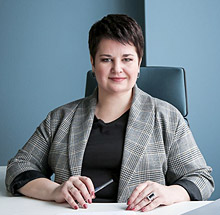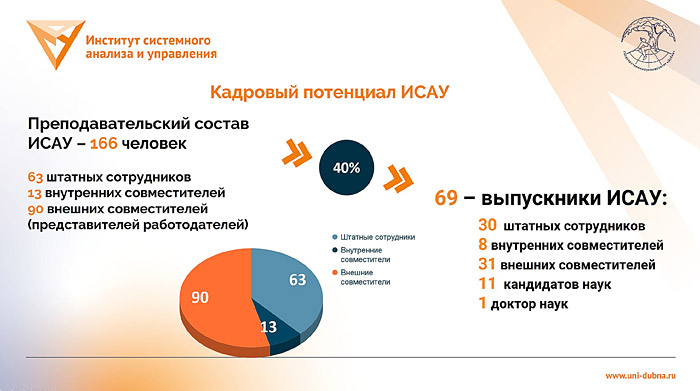
Electronic english version since 2022 |
The newspaper was founded in November 1957
| |
At the Dubna State University
About the ISAM phenomenon and development prospects
The area "System Analysis and Management", from which today's ISAM State Dubna University has developed, is one of the three with which the university began 30 years ago. So, for all ISAM employees, the anniversary year 2024 is special. It's time to sum up results and to make up new plans.
 Today's incredible demand for IT specialists 30 years ago was obvious to the founders of the ACM area, but it was not so for the first students. "Almost all of us wanted to become economists," ISAM director Elena Yurievna Kirpicheva says that was a student at the very first intake of Dubna University, remembering herself in her first year.
Today's incredible demand for IT specialists 30 years ago was obvious to the founders of the ACM area, but it was not so for the first students. "Almost all of us wanted to become economists," ISAM director Elena Yurievna Kirpicheva says that was a student at the very first intake of Dubna University, remembering herself in her first year.
Over the years, several eras have changed in the IT field and the demand for IT specialists has grown exponentially. Today, in Russia there are about 800 thousand IT specialists and there are still as many missing. ISAM teachers are convinced that their main mission is to teach how to learn. Because if you work or teach in the IT field, the only thing that remains constant is that it is impossible to stop developing. This tension concerning the rate of development of information technologies and the need for constant changes in educational programmes is the wind that has been filling the sails of ISAM for 30 years.
Today, we are talking with ISAM Director Elena Yurievna Kirpicheva about what horizons ISAM currently strives for and what new areas it plans to develop.
Elena Yurievna, what is the main task of ISAM today?
- The main task of ISAM has been and is unchanged - to train in-demand IT specialists. The systematic approach implemented in personnel training has repeatedly demonstrated its effectiveness over the years of development of ISAM and becomes more and more relevant every year.
The employment rate of our graduates in their specialty is at least 95% and the enormous demand for IT specialists in our country only contributes to an increase in this figure. The success of a modern IT specialist is determined by a constantly evolving system of professional qualities. Therefore, our educational model is aimed at ensuring that ISAM graduates are IT professionals with systems thinking and the ability to adapt to different application areas, as well as specialists capable of constant self-development, creativity and the ability to work in a team.
Among ISAM teachers, about 30 graduates are representatives of employers and their role is very important. Our graduate teachers work in such partner organizations, such as: JINR, All-Russian Petroleum Research Exploration Institute (VNIGRI), Aerospace Systems, Logstream, Nordavind-Dubna, Aritmos and others.

It is very pleasant that graduates from different years contact us with offers of cooperation in training personnel for their companies. The family of ISAM graduates today no longer has boundaries and it is gratifying that the number of families of ISAM graduates also grows every year.
What is the role of ISAM in the development of the university today?
- One of the key tasks within the university's development strategy today is digital transformation. ISAM plays an important role in meeting this issue. As part of the Digital University project, we participate in the development of a digital twin of the university based on GIS, in the development of an internal electronic document management system and various electronic services.
We develop this work in close cooperation with our colleagues from MLIT JINR that have extensive experience in developing a unique digital ecosystem of the Institute. The "Digital JINR" project is supervised by the Scientific Leader of MLIT and Head of the basic department of RIVS ISAM V.V. Korenkov and ISAM graduates take an active part in it. The implementation of the "Digital University" project in cooperation with the JINR digital ecosystem contributes not only to the development of the university, but also to the development of our joint scientific and educational cooperation and potential.
Elena Yurievna, what do you see as the key to the success of ISAM? What is your particular focus today?
- Today, the primary task for us is the development of the ISAM laboratory base and computer support for the educational process at the university. For training personnel within the framework of modern educational programmes focused on mastering end-to-end digital technologies, the material and technological base is a very important factor. A digital ecosystem of laboratories has been developed at ISAM that integrates big data processing technologies, computer security, artificial intelligence, cloud technologies and virtual and augmented reality technologies, as well as geoinformation technologies, industrial automation and intelligent control technologies, robotics and 3D simulation. The rapid development of IT solutions in these areas poses the task of improving the hardware and software base in accordance with the state development strategy. We see the potential for successfully meeting this issue in the implementation of the university's digital transformation strategy, the development of strategic projects, federal scientific projects, cooperation with partners and graduates.
Undoubtedly, personnel are the most valuable component of success. For us, the issue of developing human resources is always a key issue and I really hope that training in-demand IT specialists for the development of the digital economy of our country will be not only an honorable, but also a prestigious job for both full-time employees and employer representatives.
And of course, the key to our successful future consists of talented applicants that become our students and make a great contribution to the development of the IT industry in our country.
Interviewed by Anna EPSTEIN